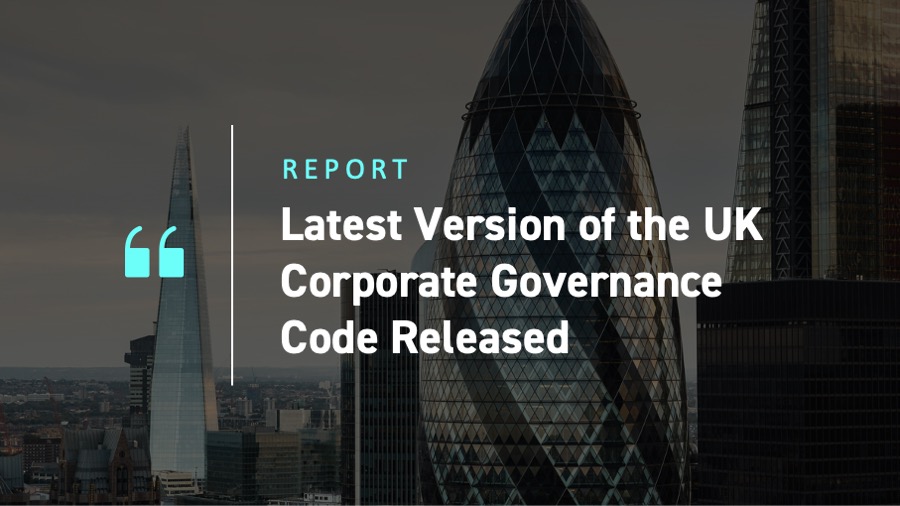On 22 January 2024, the Financial Reporting Council (FRC) published the latest version of its UK Corporate Governance Code (the Code), with almost all provisions to come into force for financial years beginning on or after 1 January 2025.
A consultation on a revised Code was launched in May 2023, concluding in September last year. Central to the proposed amendments was an expansion of the Audit Committee’s remit to include the development, implementation and maintenance of a company’s audit and assurance policy, and an increased focus on ESG reporting, including how E&S matters are considered when establishing a company’s strategy. However, following the King’s Speech to Parliament in November 2023, which announced that the UK Government’s previously disclosed plan for primary legislation to modernise the regulation of audit, corporate reporting and governance had not been prioritised for the next Parliamentary session, the FRC published a statement, which stated that only a small number of the proposed amendments to the Code were to be taken forward. When the revised version of the Code was published in January 2024 it became evident that indeed only a few of the proposed changes had been incorporated.
Amendments to the revised Code
The ‘comply or explain’ principle remains the cornerstone of the Code, with companies required to comply with its precepts or explain why they have deviated from them. A minor amendment has been made to the principle, with the Code now encouraging companies to report on board decisions and their outcomes in the context of their strategy and objectives. In recent years, one of the FRC’s common criticisms has been that comply or explain disclosures are often formulaic in nature, with reporting often providing little detail in relation to what governance practices a company has actually carried out. This change has therefore been seen by some commentators as an attempt to deter companies from disclosing boilerplate statements to explain deviations from the Code.
However, it is yet to be seen what guise this outcome reporting is expected to take, with some replies to the initial consultation stating that such reporting could prove too vague to be useful, as the FRC does not outline what outcomes should be presented. One concern was the risk that, without specific guidance or training, companies could default to a different type of boilerplate response, in which unjustified or tenuous links could be made in relation to the impact of specific corporate governance practices or arrangements. The proposed changes to the comply or explain principle are discussed in more detail here.
Another change to the Code was to Provision 29 on the monitoring of a company’s risk management and internal control framework. The amended version outlines the disclosures that companies should include in their annual reports, which include the following:
- A description of how the board has monitored and reviewed the effectiveness of the framework.
- A declaration of effectiveness of the material controls as at the balance sheet date.
- A description of any material controls which have not operated effectively as at the balance sheet date, the action taken, or proposed, to improve them and any action taken to address previously reported issues.
However, unlike the other amendments to the Code, the change to Provision 29 will come into force only from accounting periods beginning on or after 1 January 2026. According to the FRC, this is to allow sufficient time for implementation of the changes.
An amendment to Principle O also clarifies that company boards are not only responsible for the establishment of risk management and internal control framework, but also the effectiveness of that framework.
Other smaller amendments to the Code include the following:
- Principle J has been reworded to omit any mention of any specific groups or characteristics in relation to the promoting of diversity, inclusion and equal opportunity. This streamlining is in keeping with the FRC’s removal of any prescriptive wording from the Code.
- Wording has been added to Provision 37 to make clear that directors’ contracts, and other agreements or documents that cover remuneration, should include malus or clawback provisions.
- A new Provision 38 has been added, which states that companies should include in their annual reports a description of their malus and clawback provisions. This information includes the circumstances in which malus and clawback provisions could be used, a description of the period for malus and clawback and why the selected period is best suited to the organisation, and whether the provisions were used in the last reporting period and if so, a clear explanation of the reasons for their use.
The revised Code, although less extensively reformed than initially envisioned in the FRC’s consultation, has therefore seen some notable amendments, especially in relation to internal controls and malus and clawback. However, it is yet to be seen if the amendment to the comply or explain principle will have an effect on how deviations from the Code are disclosed.
By: Tom Inchley




